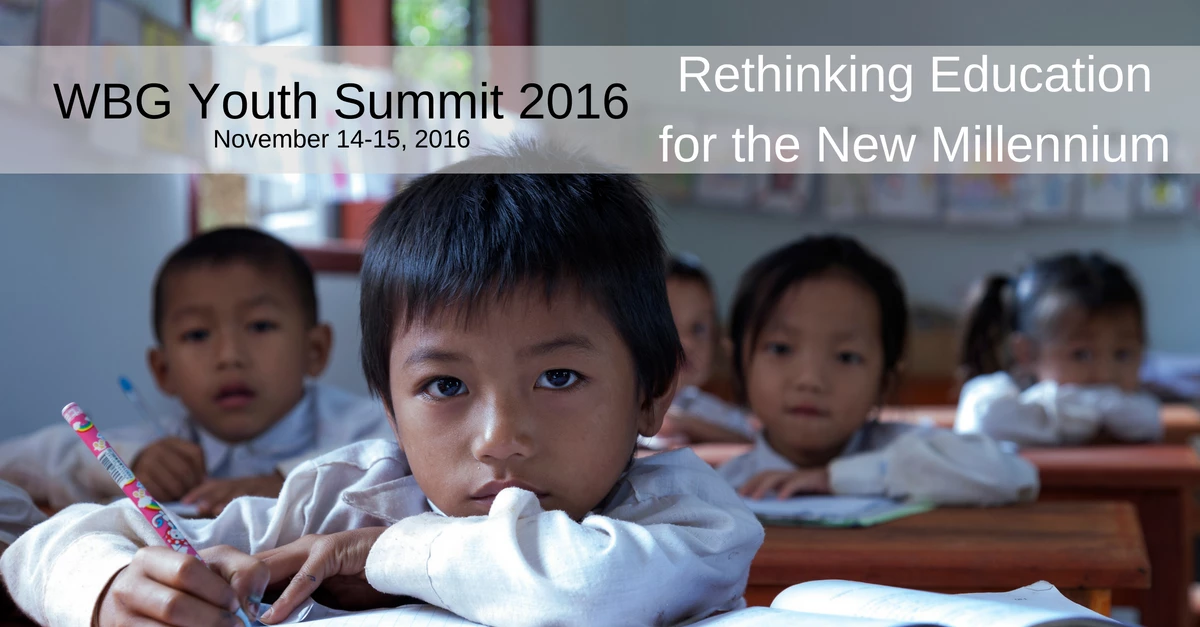
Education gives people the skills and tools they need to navigate the world and is crucial to the overall development of an individual and society at large. According to the United Nations Educational, Scientific, and Cultural Organization (UNESCO), every additional year of education can increase a person’s future income by an average of 10 percent in developing, low-income countries.
The Youth Summit was established in 2013 by the World Bank Group to provide a platform for the concerns of youth and empower young people to promote their ideas on development. The 2016 Youth Summit will connect youth with experts from the international development community, private sector, government, and academia with the objective of engaging views, ideas, and debate to rethink the future of education.
Youth Summit 2016: Rethinking Education for the New Millennium takes place November 14-15 from 8 a.m. to 6 p.m. at the World Bank Headquarters in Washington, DC.
In addition to plenary sessions, the Youth Summit will feature a competition for passionate youth to demonstrate their innovative ideas to transform education. Education systems around the world are failing to provide young people with the skills they need to fully realize their potential. Challenges are numerous and complex – there is no one-fits-all solution. The purpose of the competition is to task young people to solve the problems that matter to them in order to build the future they want.
Hands-on workshops facilitated by lauded education specialists will center on the following topics:
- Innovation and Technology in Education: The digital revolution has transformed modern life by revolutionizing industries and jobs, disrupting political systems, and radically altering how individuals relate with the world and each other. The millennial generation, the first to grow up immersed in digital technologies, is best equipped to answer the key question: How can the technologies that have so successfully disrupted industry after industry help generate new value in education?
- Skills for the New Economy: Almost 300 million 15 to 24-year-olds are not working. As we transition into an era where machines will perform complex tasks, what skills should schools teach? How can reforms in education and training help the young generation adapt to the new economy and overcome the epidemic of youth unemployment?
- Gender Equality in Education: Research has shown that lower education for females is correlated with higher maternal and infant mortality, worse child nutrition, and higher rates of HIV/AIDS. Equal opportunities cannot develop from a biased education system. How can we expand the promise of a quality education to all children, regardless of gender?
- Education in Crisis Zones: Nearly one in four of the world’s school-aged children – 462 million – now lives in 35 countries affected by crises, including an estimated 75 million children who are in desperate need of educational support. How can and should education adapt to the extreme conditions that these children endure?
_____________________________________________________________________________________________________________________
For more information about the Youth Summit 2016, including the full schedule of events, visit: www.worldbank.org/en/events/2016/08/22/youth-summit-2016
To watch Youth Summit 2016 via livestream, visit http://live.worldbank.org/wbg-youth-summit
For general inquiries about the Youth Summit, contact: youthsummit@worldbank.org
To see the success of last year's Youth Summit, visit http://documents.worldbank.org/curated/en/998081470632452685/pdf/107501-REVISED-WBG-Youth-Summit-2015-Completion-Report.pdf


Join the Conversation